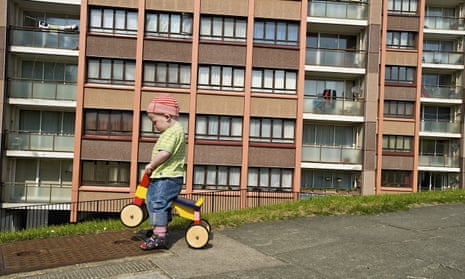An extra 1.5 million children will have been pitched into poverty by 2021 as a consequence of the government’s austerity programme, according to a study of the impact of tax and benefit policy by the Equality and Human Rights Commission.
The EHRC study forecasts dramatic increases in poverty rates among children in lone parent and minority ethnic households, families with disabled children and households with three or more children.
There are clear winners and losers from austerity tax and benefits changes since 2010, the study says. The regressive nature of the policies means that low-income families have been hit hardest: the poorest fifth will lose 10% of income by 2021, while the wealthiest fifth will see little or no change.
David Isaac, chair of the EHRC, said: “It’s disappointing to discover that the reforms we have examined negatively affect the most disadvantaged in our society. It’s even more shocking that children – the future generation – will be the hardest hit and that so many will be condemned to start life in poverty.”
The commission called on the government to reconsider existing policies that hit the most disadvantaged groups hardest, and to review social security benefit levels to ensure they provide an adequate standard of living.
The study says the negative financial impacts are largely driven by the four-year freeze on working-age benefits from April 2016, cuts to disability benefits and reductions to work allowances in universal credit.
The findings include:
- Children in 62% of lone parent households will be in poverty in 2021, compared to 37% in 2010. Lone parent households will lose an average of £5,250 – a fifth of their income.
- The largest increases in child poverty measured by ethnic group will be in Pakistani families (up almost a fifth), while Bangladeshi households will lose £4,400 on average.
- Households with a disabled adult and a disabled child will shoulder annual cash losses of just over £6,500, equivalent to 13% of their net income. Disabled lone parents with a disabled child stand to lose £10,000 a year.
The study, which was carried out by the economists Jonathan Portes and Howard Reed, examined the cumulative impact on different groups of changes to income tax, VAT, national insurance, social security benefits, tax credits, universal credit and the national living wage.
It concludes that although changes to taxes and benefits were a clear consequence of the government’s commitment since 2010 to reduce the deficit, it was not inevitable that the most vulnerable groups would bear the heaviest burden, and that the precise mix of changes was a political choice.
A government spokesperson said the report did not take into account many changes made since 2010. “Automatic enrolment pension saving and near record employment are just two issues which contribute enormously to people’s lives but are not reflected in the analysis,” they said.
